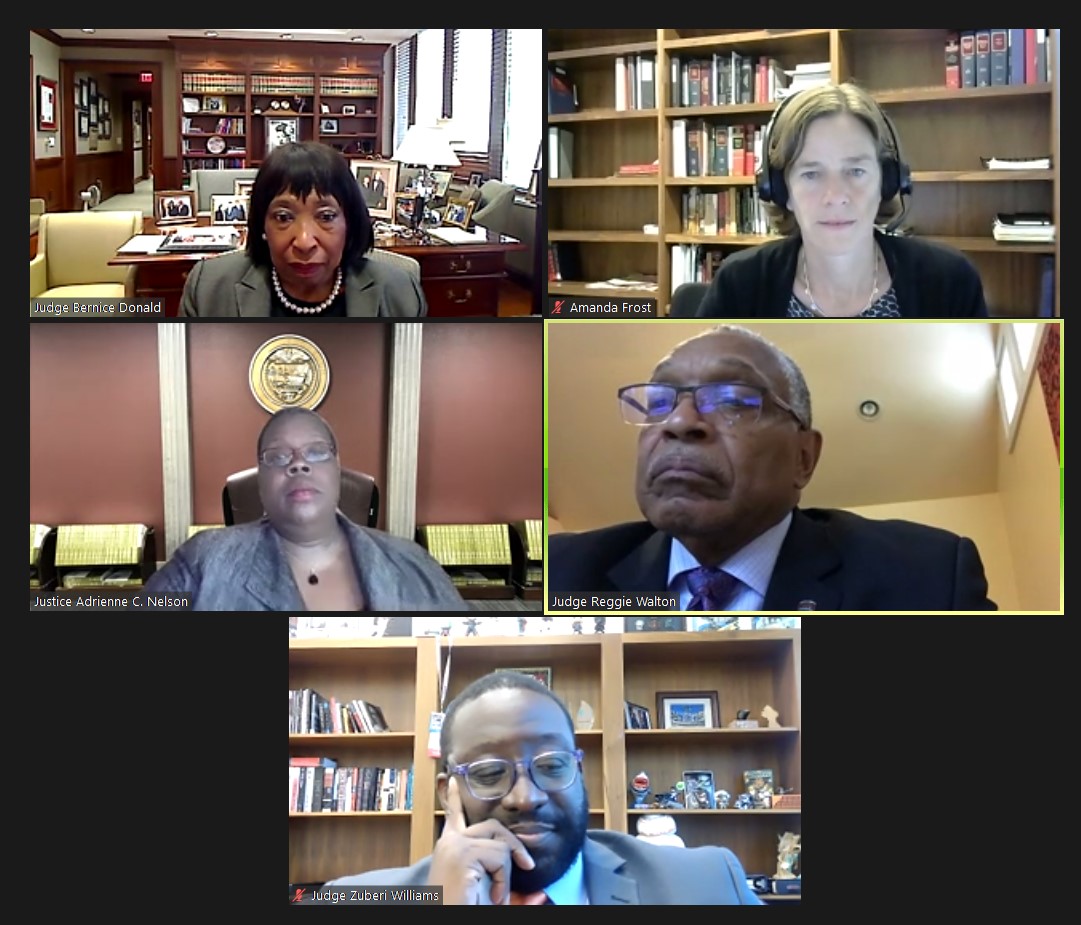AUWCL Hosts “Racial Justice and the Courts” Panel
Sept. 11, 2020
On Sept. 10, American University Washington College of Law hosted a panel discussion on racial justice within the American court system, welcoming judges and justices from across the country to share their insights.

The virtual discussion – organized by Program on Law and Government Professor Steve Wermiel ’82 – was moderated by Ann Loeb Bronfman Distinguished Professor of Law and Government Amanda Frost. The panel featured:
- Hon. Bernice Donald, Judge of the U.S. Court of Appeals for the Sixth Circuit
- Hon. Adrienne Nelson, Associate Justice of the Oregon Supreme Court
- Hon. Reggie Walton ’74, U.S. District judge for D.C.
- Hon. Zuberi Williams ’03, Associate Judge of the District Court of Maryland, District 6
As someone who has been stopped by law enforcement for doing “nothing other than driving while black,” Judge Walton said he can appreciate and relate to many of the experiences had by the individuals coming before him in courtroom.
“The sad reality is that too often, when [police] come into court and... testify contrary to a civilian, especially if it is a black civilian, they are given credit for their testimony – even though sometimes it is false,” Walton said. “That’s because of the attitude that judicial officers sometimes have about law enforcement officials, as compared to the attitude they may have, for example, about a young black male who is in court charged with a crime.”
“If nobody is telling you, or if there is some doubt: there is absolutely systematic racism in our judicial system and criminal justice system,” Judge Williams said. “It’s true, because I see it on a daily basis.”
Leadership must make training on implicit, or unconscious, bias mandatory before any real change can be made, he said.
“Any time in the judiciary where there is a problem, we have all these mandatory courses – during the Me Too movement we had mandatory sexual harassment courses, and courses for other movements,” Williams said. “But when we talk about racial bias, there’s no push. It has to be mandatory to have any real meaning. You also have to talk about bias in yourself. Judges don’t stand on ivory towers.”
Judge Donald pointed out that “when we talk about the rule of law,” there is often no shared definition because of the problem of race. Law is “not self-executing,” she said. All of us need to do the work to improve the administration of justice and the perception of justice in order to build confidence in the institution of the judiciary.
Citing a recent opinion by Federal District Judge Carlton Reeves of Mississippi, Justice Nelson said that when people of every race, ethnicity, religion, gender and sexual orientation can see their own experiences reflected in our highest institution, they “receive hope and inspiration beyond measure.”
“I believe that we have an obligation to the public so that they have trust and confidence in us, and that means we have to think about how we actually administer justice,” she said.
Walton added that, while the judicial system is by and large a good system, we have a long way to go before it becomes a perfect system, adding “I hope that these type of discussions, and a willingness to be honest about the problem, will cause us to be able to improve the quality of justice for all who come into our courtroom, regardless of who they are and what they look like.”